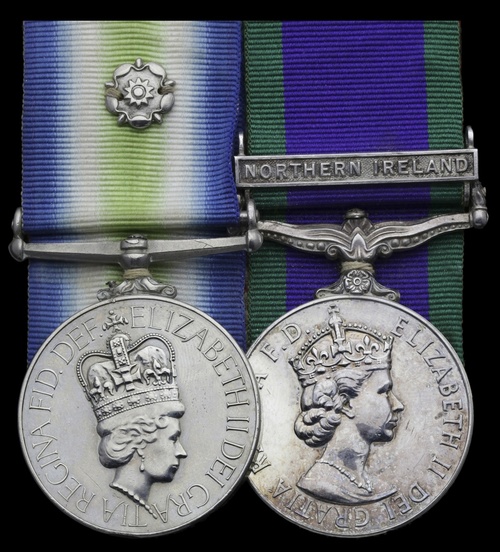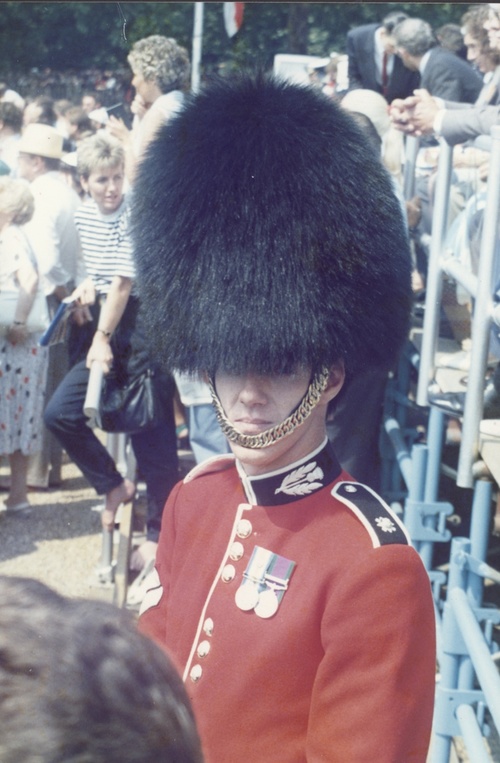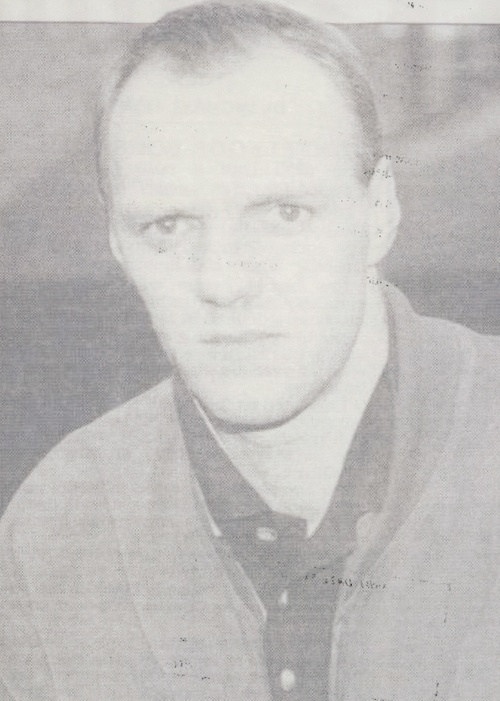Auction: 20002 - Orders, Decorations, Medals & Space Exploration
Lot: 600
The poignant campaign pair awarded to Lance-Sergeant A. Findlay, 2nd Battalion, Scots Guards, who was wounded and saved a wounded comrade by performing a field tracheotomy by slitting his neck and using a hollow pen in the Battle for Mount Tumbledown - as a result of the Army’s failure to acknowledge that he was suffering from P.T.S.D. he subsequently made a high profile and ultimately successful legal claim against the M.O.D. which had far reaching effects on the British Court Martial system
South Atlantic 1982, with rosette (24585084 Gdsm A Findlay SG); General Service 1962, 1 clasp, Northern Ireland (24585084 LCpl A Findlay SG), mounted court-style as worn, one or two minor edge bruises and contact wear, otherwise good very fine (2)
Alex Findlay served with 15 Platoon, Left Flank Company during the Battle for Mount Tumbledown and was one of the seven men under Major Kiszely M.C., who made it to the top of the mountain. He was wounded in action in the hand by automatic gunfire on the summit, alongside his Platoon Commander Lieutenant Mitchell, as depicted in the famous painting by Terence Cuneo, The Battle of Tumbledown Mountain. Just prior to that, Guardsman Findlay had carried out an emergency tracheotomy on a friend who had been shot in the throat.
That friend was Scott Binney and the pair were reunited in 1997. Findlay said:
'I remember breaking the crest of the hill and suddenly there was this tremendous sound of gunfire, shells everywhere, it was absolutely terrifying. We all just hit the deck and lay there, scared out of our wits. It was only when our Section Commander, Lance-Sergeant Clark Mitchell came running to me and told me to get up and fight that I had the courage to move. As we did a line of machine gun fire splattered between the two of us, just missing us. Clark said:
"They're trying to kill you, get up and get on with it."
We were running around and didn't really know what was happening or who was where. I saw Scott go down and went over to help him. All I knew was that he could hardly breath. I grabbed him and held him down and emptied clots of blood out of his mouth with my hands. He was screaming and screaming begging me to shoot him. He even tried to turn his rifle on himself.
I knew I had to get some air into him so I slit his throat with my bayonet and stuck a hollow Chinograph pen into the hole, till I could see some air was being sucked in. I went to get help but was told to get on with fighting, just to leave him. I thought they would court-martial me when they found out what I'd done.'
Once the battle was over and his friend was removed from the field, Findlay assumed he was dead as he heard nothing for two days, but it later transpired he was being treated aboard the Uganda.
Findlay later served as a Lance Sergeant in Northern Ireland and it was here in 1990 where his earlier service in the Falklands caused extremely unfortunate repercussions. Unknowingly suffering from Post Traumatic Stress Disorder (PTSD) from his time in the Falklands, where he had repeatedly bayoneted a young Argentinean to death, he reacted violently to a can of beer being opened whilst on service in July 1990 at Londonderry. He pulled a gun, took several comrades hostage which resulted in his Court Martial, demotion, dismissal and a two year prison sentence. His appeal against sentence was rejected but he later received £100,000 plus costs when he brought a civil action against the Defence Secretary alleging negligence in failing to diagnose and treat the PTSD that had resulted from the Battle for Tumbledown in 1982. It is possibly the first case in which the British Army recognised the issue of PTSD amongst its veterans.
In an unprecedented ruling during 1995, the European Commission for Human Rights agreed that the traumatised Falklands veteran had been denied a fair hearing at the Court Martial that had ended his Army career and agreed unanimously to refer the case of Mr Findlay to the European Court of Human Rights.
In 1997 European judges ruled that Britain’s Court Martial system was illegal, a momentous decision of great consequence to modern British Military legal history; sold together with original Regular Army Certificate of Service ‘Red Book’, a photograph of recipient in uniform wearing his medals and numerous newspaper cuttings relating to his court case which give further background detail on recipients military service and subsequent court martial.
Subject to 20% VAT on Buyer’s Premium. For more information please view Terms and Conditions for Buyers.
Sold for
£3,000
Starting price
£1200











